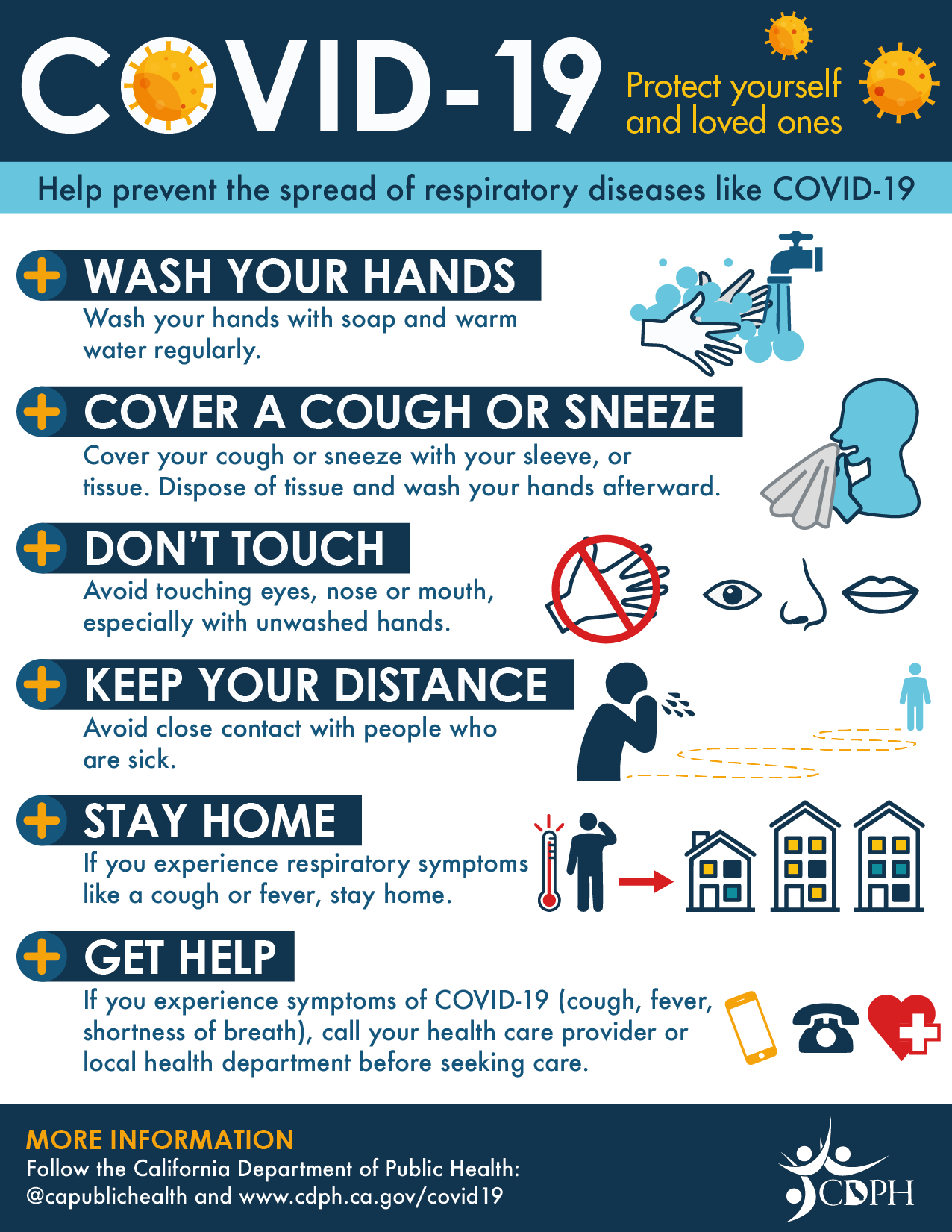The COVID-19 virus spreads primarily through droplets of saliva or discharge from the nose when an infected person coughs or sneezes, so it's important that you also practice respiratory etiquette (for example, by coughing into a flexed elbow).

Seven simple steps to protect yourself and others from COVID-19
Coronavirus disease (COVID-19) is the infectious disease caused by the most recently discovered coronavirus. Most people who become infected experience mild illness and recover, but it can be more severe for others, particularly older people and those with underlying medical conditions. Here are some simple steps you can take to protect your health and the health of other people.
Everyone can follow these recommendations, but they are particularly important if you are in an area where people are known to have COVID-19.
1. Wash your hands frequently
Regularly and thoroughly clean your hands with an alcohol-based hand rub or wash them with soap and water.
Why? We frequently use our hands to touch objects and surfaces that may be contaminated. Without realizing it, we then touch our faces, transferring viruses to our eyes, nose and mouth where they can infect us. Washing your hands with soap and water or using alcohol-based hand rub kills viruses that may be on your hands — including the virus that causes COVID-19.
2. Avoid touching your eyes, nose and mouth
We often touch our faces without noticing it. Be aware of this, and avoid touching your eyes, nose and mouth.
Why? Hands touch many surfaces and can pick up viruses. Once contaminated, hands can transfer the virus to your eyes, nose or mouth and can then enter your body and make you sick.
3. Cover your cough
Make sure that you, and the people around you, follow good respiratory hygiene. This means covering your mouth and nose with the bend of your elbow or with a tissue when you cough or sneeze. Dispose of the used tissue immediately into a closed bin and wash your hands.
Why? When someone coughs or sneezes they spray small liquid droplets from their nose or mouth which may contain virus. By covering your cough or sneeze you avoid spreading viruses and other germs to other people. By using the bend of your elbow or a tissue and not your hands to cover your cough or sneeze, you avoid transferring contaminated droplets to your hands. This prevents you from contaminating a person or a surface through touching them with your hands.
4. Avoid crowded places and close contact with anyone that has fever or cough
Avoid crowded places, especially if you are over 60 or have an underlying health condition such as high blood pressure, diabetes, heart and lung diseases or cancer. Maintain at least 1 metre of distance between yourself and anyone who has a fever or cough.
Why? COVID-19 spreads mainly by respiratory droplets that come out of the mouth or nose when a person who has the disease coughs. By avoiding crowded places, you keep yourself distant (at least 1 metre) from people who may be infected with COVID-19 or any other respiratory disease.
5. Stay at home if you feel unwell
Stay at home if you feel unwell, even with a slight fever and cough.
Why? By staying home and not going to work or other places, you will recover faster and will avoid transmitting diseases to other people.
6. If you have a fever, cough and difficulty breathing, seek medical care early — but call first
If you have a fever, cough and difficulty breathing, seek medical care early — if you can, call your hospital or health centre first so that they can tell you where you should go.
Why? This will help to make sure you get the right advice, are directed to the right health facility, and will prevent you from infecting others.
7. Get information from trusted sources
Stay informed about the latest information from about about COVID-19 from trusted sources. Make sure your information comes from reliable sources — your local or national public health agency, the World Health Organization (WHO) website, or your local health professional. Everyone should know the symptoms — for most people, it starts with a fever and a dry cough.
Why? Local and national authorities will have the most up-to-date information on whether COVID-19 is spreading in your area. They are best placed to advise on what people in your area should be doing to protect themselves


Comments
Post a Comment